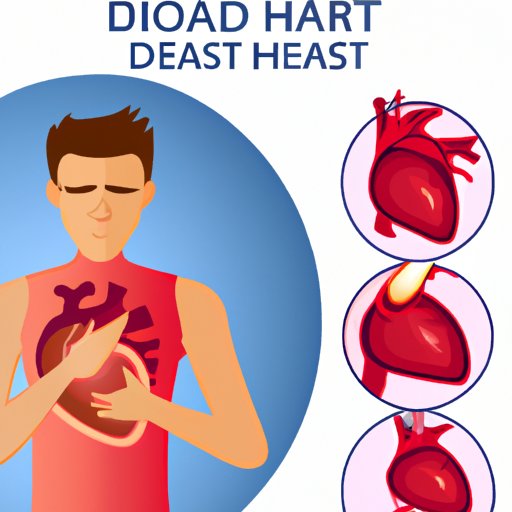
Introduction
Heart disease is a serious condition that affects millions of people worldwide. According to the World Health Organization, heart disease is the leading cause of death globally, responsible for about one-third of all deaths. While some risk factors for heart disease, such as age and family history, are beyond our control, many other factors, such as lifestyle choices and diet, can be modified to reduce our risk of developing heart disease. Early detection of heart disease is crucial, as it can often be treated more effectively if caught early. In this article, we will explore the signs of heart disease and how to recognize them.
Top 10 Warning Signs of Heart Disease
Here are the 10 most common warning signs of heart disease:
1. Chest pain or discomfort: This is the most common symptom of heart disease and is often described as a squeezing or pressure-like sensation in the chest area.
2. Shortness of breath: Feeling winded or out of breath, especially when engaging in physical activity, is another common symptom of heart disease.
3. Fatigue: Feeling tired or exhausted even after a good night’s sleep is a common sign of heart disease.
4. Dizziness or lightheadedness: Feeling dizzy or faint is often a sign that your heart is not pumping blood as effectively as it should.
5. Swelling in the feet, ankles, or legs: This can be due to a buildup of fluid in the body, which can be a sign of heart disease.
6. Irregular heartbeat: Feeling like your heart is skipping a beat or beating too fast or too slow can be a sign of heart disease.
7. Nausea or vomiting: These symptoms can occur when your body is not getting enough oxygen-rich blood due to heart disease.
8. Pain or discomfort in the arms, neck, jaw, or back: These symptoms can occur when your heart is not getting enough blood and oxygen, and can be a sign of an impending heart attack.
9. Heartburn or indigestion: These symptoms can be caused by a lack of blood flow to the digestive system, which can occur with heart disease.
10. Flu-like symptoms: Feeling achy, feverish, or generally unwell can be a sign of heart disease, especially in women.
How to Recognize Symptoms of Heart Disease
Recognizing the symptoms of heart disease is essential, as early detection can save lives. There are several ways to recognize symptoms of heart disease:
– Keep a journal: Note any symptoms or changes in your health that you experience, including chest pain, shortness of breath, or fatigue.
– Pay attention to your breathing and heart rate: If you notice that you are becoming winded more easily than usual, or your heart rate seems to be faster or irregular, this may be a sign of heart disease.
– Schedule regular check-ups with your doctor: If you are at risk for heart disease, make sure to schedule regular check-ups with your doctor to monitor your health.
Early Warning Signs of a Heart Attack
A heart attack occurs when blood flow to the heart is blocked, usually due to a buildup of plaque in the arteries. There are several early warning signs of a heart attack, including:
– Chest pain or discomfort that may radiate to the arms, neck, jaw, or back.
– Shortness of breath.
– Nausea or vomiting.
– Dizziness or lightheadedness.
If you experience any of these symptoms, seek medical attention immediately, as untreated heart attacks can be life-threatening.
Common Signs and Symptoms of Heart Disease
While chest pain is the most common symptom of heart disease, there are several other signs and symptoms that may indicate the presence of heart disease. These can include:
– Fatigue and weakness.
– Swelling in the ankles, legs, or feet.
– Irregular heartbeat.
– Pain or discomfort in the jaw, neck, back, or arms.
– Heartburn or indigestion.
– Shortness of breath, especially with exertion.
In women, the symptoms of heart disease may be more subtle and less pronounced than in men. Women may experience nausea, vomiting, and flu-like symptoms, rather than the classic chest pain and discomfort.
What Your Body is Trying to Tell You About Heart Disease
Your body may be trying to tell you that something is wrong by exhibiting a variety of symptoms, including changes in your skin color and texture, changes in your mental health, and changes in your sleep patterns. For example, if you notice that your skin looks bluish or gray, this may be a sign that your body is not getting enough oxygen-rich blood. Anxiety, depression, and irritability can also be symptoms of heart disease, as can difficulty sleeping and insomnia.
If you notice any changes in your health or body, it’s essential to monitor them and seek medical attention if needed. Don’t ignore potential warning signs or dismiss them as something minor.
Conclusion
Recognizing the signs of heart disease is crucial in reducing your risk of developing this deadly condition. Be aware of your body’s signals and monitor any changes in your health carefully. Remember that early detection of heart disease can save lives, so seek medical attention if you suspect that you may have heart disease or are at risk for it. With the right lifestyle changes, diet, and medical treatment, you can improve your heart health and reduce your risk of developing heart disease.




